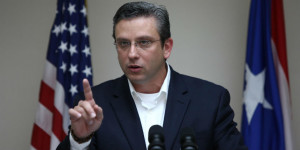Puerto Rico Is Going Broke. That Could Be Bad for Your Savings Account.
Los expertos contratados por el gobierno puertorriqueño son contudentes: para situaciones de urgencia, medidas excepcionales. El equipo liderado por la economista Anne Krueger, que dirigió el Fondo Monetario Internacional y estuvo en la primera línea del Banco Mundial, ha entregado sus recomendaciones al gobierno y a los legisladores. Los expertos critican que, en Puerto Rico, es más fácil vivir de los subsidios que de un salario y alertan de que el nivel de deuda es “insostenible” ante la situación actual. Recetan a Puerto Rico “un paquete integrado” de reformas con el difícil objetivo de que frene el gasto público drásticamente sin dañar la actividad económica: 1. Poner fin al salario mínimo, 2. Recortar las prestaciones, 3. Subir los impuestos, 4. Rebajar el costo energético, 5. Contratar barcos que no sean estadounidenses, 6. Reestructurar la deuda: Los expertos hablan de un gasto público excesivo y una carga de la deuda asfixiante para la isla de 3.5 millones de habitantes. Para lo primero, recomienda recortar en 2,000 millones de dólares anuales el gasto, es decir, recortar el 20 % del presupuesto actual. Para la deuda, aboga por reestructurar: que los vencimientos sean a más largo plazo y den más margen de maniobra al gobierno.
Greece isn’t the only popular vacation destination on the verge of bankruptcy.
In an interview with the New York Times released June 28, Puerto Rican Gov. Alejandro García Padilla admitted his government is unable to pay $73 billion in debt to its bondholders. He is expected to give a speech later today outlining the extent of the problems. The short version is, things are not good.
But Puerto Rico isn’t Greece. It’s not going to have the far-reaching implications that the Greece crisis does; it’s not San Juan’s problem with servicing debt that caused stocks to trade 200 points lower Monday morning.
Puerto Rico has the advantage of being a U.S. commonwealth. Because of that status, the United States is obligated to give García Padilla an assist, although it’s not quite clear what that help will be. And the federal government has dealt with government bankruptcies before, most recently when Detroit went belly up in 2012.
But because Puerto Rico is a commonwealth, not a city, it doesn’t have the option of filing for bankruptcy in the same way Detroit did, and here’s where things get complicated and potentially bad for American consumers. Under the terms of the Chapter 9 bankruptcy that Detroit filed, there is a clearly delineated process for investors to recoup a portion of their money.
Because it is a commonwealth, Puerto Rico isn’t eligible for this process. It has to come to an agreement with creditors — in other words, the people who lent it money need to agree to a so-called “haircut,” or accepting less than what they’re owed.
You can see García Padilla starting to make that case. In his Times interview, he said, “If they don’t come to the table, it will be bad for them…. What will happen is that our economy will get into a worse situation and we’ll have less money to pay them. They will be shooting themselves in the foot.”
Here’s where there are direct parallels to what’s going on in Greece this week. Athens can’t pay back what it owes its creditors either and wants the IMF, the European Central Bank, and the European Commission to forgive some of its debt. American consumers are largely insulated from that crisis.
Not so in Puerto Rico. In 2013, about three-quarters of municipal bond mutual funds had exposure to Puerto Rican debt. The commonwealth’s municipal bonds have been an attractive investment because they are free from federal U.S. taxes. That means money managers like Charles Schwab and Franklin Templeton have to agree to get paid back less than what they lent. The value of the funds that contain Puerto Rican bonds will inevitably go down.
Municipal bonds are popular with money market fund managers looking for guaranteed, but modest, returns. U.S. savings accounts often plant money in them; it’s why typical American savings and money market accounts grow at such a slow, but steady, pace.
And the size of Puerto Rican debt is much larger than Detroit’s debt load. The Michigan city couldn’t pay $20 billion. García Padilla’s government can’t pay back $72 billion, so its lenders are going to have to swallow a sizable haircut.
In other words, money managers must now scramble to make up for anticipated losses because Puerto Rico can’t pay its bills. If they can’t, their customers — American consumers — will end up getting the short end of the stick.
En: foreignpolicy

